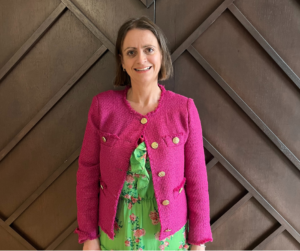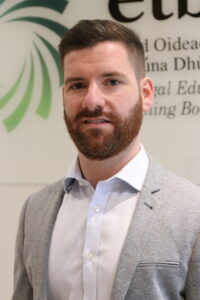 Donegal Education and Training Board (ETB) plays a crucial role in overseeing the strategic direction and operational management of Donegal ETB’s post-primary schools, Further Education and Training Service (FET) and a wide range of programmes, including Donegal Music Education Partnership and youth work, within the county. It is made up of twenty-one people – twelve elected representatives, five nominated special interest representatives, two nominated parent representatives and two elected staff representatives. How are the staff representatives picked and what do they do? In this blog, one of them, English for Speakers of Other Languages (ESOL) Coordinator, Joanne Donaghy, explains.
Donegal Education and Training Board (ETB) plays a crucial role in overseeing the strategic direction and operational management of Donegal ETB’s post-primary schools, Further Education and Training Service (FET) and a wide range of programmes, including Donegal Music Education Partnership and youth work, within the county. It is made up of twenty-one people – twelve elected representatives, five nominated special interest representatives, two nominated parent representatives and two elected staff representatives. How are the staff representatives picked and what do they do? In this blog, one of them, English for Speakers of Other Languages (ESOL) Coordinator, Joanne Donaghy, explains.


Two staff representatives, one male and one female, are elected by members of the almost 1,600 staff body of Donegal ETB to represent their interests in the day-to-day running of Donegal ETB’s operations. I was first elected to the Board in 2019, along with our beloved colleague, Noel Rodden, whom we all remember fondly. Sadly, Noel passed away in 2020. He was very proud of his position on the Donegal ETB Board and took his role of advocating for staff and students very seriously. Barry Molloy, a Mulroy College teacher of Construction Studies, Materials Technology (Wood), Design and Communications Graphics (DCG) and Mathematics, stepped into Noel’s position and has significantly contributed to the Board over the past few years.
Including staff representatives on the Board is a relatively recent but important enhancement to the governance structure. This change, mandated by the Education and Training Boards Act 2013, ensures staff perspectives and interests are represented in decision-making processes.
The election process for staff representatives is transparent and democratic. Elections are held periodically, and all eligible staff members can stand for election and vote for their preferred candidates. This process ensures that the elected representatives genuinely reflect the views and interests of the broader staff community.
Having staff representatives on the Board offers numerous benefits. Firstly, it ensures that the voices of those directly involved in delivering education and training services are heard. This leads to more informed and practical decision-making, as staff representatives bring firsthand experience and insights. Moreover, it fosters a sense of inclusivity and empowerment among staff, knowing that their concerns and suggestions can influence the Board’s policies and strategies.
The role of a staff representative on the Board is significant and challenging, requiring dedication to advocating for colleagues and ensuring clear communication between the Board and the staff body. It involves both deliberative and practical aspects. Staff Representatives advocate for their colleagues’ interests, ensure transparency in governance and contribute to the ETB’s overall strategic vision. In practice, this means attending Board meetings, sitting on Boards of Management and sub-committees, and engaging in discussions on various operational issues, from budget allocations to programme development. I sit on the Board of Management of Errigal College, a role I very much enjoy as it provides great insight into the exemplary work that is taking place in our ETB schools. I was particularly struck by how hard staff work to ensure that the core values of an ETB school, respect, equality, excellence in education, community and care, are incorporated into everything they do. I also sit on the FET Service Quality Council as a staff representative; the Quality Council is part of the government and management structure of Donegal ETB’s FET Service and oversees the planning, coordination, quality, development and improvement of all aspects of the FET offerings of the ETB. The Staff representatives can also be called upon to sit on interview panels as the Board representatives.
Reflecting on the past five years, our Board has faced many challenges, from COVID-19 to the arrival of international, including Ukrainian, students. Education has undergone one of its fastest periods of change, challenging us to ensure that, while our ETB expands, the necessary supports and resources are provided for the staff and students we represent. Issues that Barry and I have advocated for include supporting staff and students affected by the defective blocks crisis, retrofitting Donegal ETB buildings for sustainability, ensuring proper resourcing of schools and Further Eduation and Training (FET) centres (to include proper IT infrastructure), fostering well-being and progressing ongoing building works, particularly new schools in Crana College, Moville Community College, Errigal College and a new centre for Lifford Youthreach.

As we prepare for the new Board term from 2024-2029, Barry is stepping down and Abbey Vocational School teacher Kyle Clarke (History, Geography and Special Education), the newly elected male staff representative, will join me. We encourage staff to utilise the mechanisms available to have their voices heard more effectively; my email address is joannedonaghy@donegaletb.ie and I would be delighted to hear from staff who wish to make contributions. Additionally, we aim to improve how we report back to the staff body. I currently provide updates, but reaching all staff is challenging. We recognise the need to develop better communication methods to ensure transparency and keep staff informed about the Board’s decisions and their impact on their work.
The inclusion of staff representatives on Donegal Education and Training Board is a progressive step towards more inclusive and effective governance. It ensures that the perspective of educators and other staff members are considered in decision-making processes, ultimately leading to better outcomes for the entire educational community here in the county.
